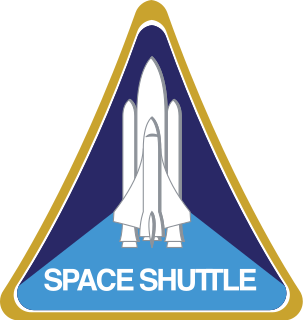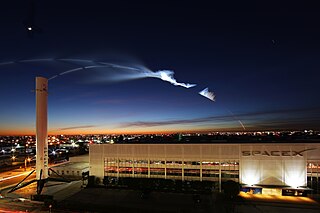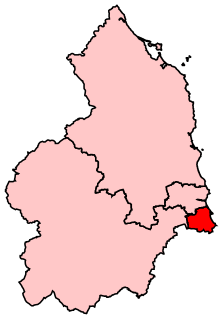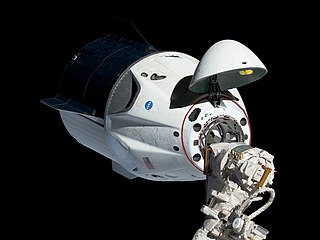
The Space Shuttle program was the fourth human spaceflight program carried out by the U.S. National Aeronautics and Space Administration (NASA), which accomplished routine transportation for Earth-to-orbit crew and cargo from 1981 to 2011. Its official name, Space Transportation System (STS), was taken from a 1969 plan for a system of reusable spacecraft of which it was the only item funded for development.

An expendable launch system is a launch vehicle that can be launched only once, after which its components are either destroyed during reentry or discarded in space. ELVs typically consist of several rocket stages that are discarded sequentially as their fuel is exhausted and the vehicle gains altitude and speed. As of October 2019, most satellites and human spacecraft are currently launched on ELVs. ELVs are simpler in design than reusable launch systems and therefore may have a lower production cost. Furthermore, an ELV can use its entire fuel supply to accelerate its payload, offering greater fuel efficiency. ELVs are proven technology in widespread use for many decades. ELVs are usable only once, and therefore have a significantly higher per-launch cost than reusable vehicles. New reusable launch systems under development by private companies such as SpaceX and Blue Origin have the potential to obsolete many existing ELVs due to the lower per-launch costs of reusable rockets.

The Constellation program is a cancelled crewed spaceflight program developed by NASA, the space agency of the United States, from 2005 to 2009. The major goals of the program were "completion of the International Space Station" and a "return to the Moon no later than 2020" with a crewed flight to the planet Mars as the ultimate goal. The program's logo reflected the three stages of the program: the Earth (ISS), the Moon, and finally Mars—while the Mars goal also found expression in the name given to the program's booster rockets: Ares. The technological aims of the program included the regaining of significant astronaut experience beyond low Earth orbit and the development of technologies necessary to enable sustained human presence on other planetary bodies.
In marketing, customer lifetime value, lifetime customer value (LCV), or life-time value (LTV) is a prognostication of the net profit contributed to the whole future relationship with a customer. The prediction model can have varying levels of sophistication and accuracy, ranging from a crude heuristic to the use of complex predictive analytics techniques.

Space Exploration Technologies Corp. (SpaceX) is an American aerospace manufacturer and space transportation services company headquartered in Hawthorne, California. It was founded in 2002 by Elon Musk with the goal of reducing space transportation costs to enable the colonization of Mars. SpaceX has developed several launch vehicles and rocket engines, as well as the Dragon cargo spacecraft and the Starlink satellite constellation, and has flown humans and cargo to the International Space Station on the SpaceX Dragon 2.
Maruti Suzuki India Limited, formerly known as Maruti Udyog Limited, is an Indian automobile manufacturer company, founded by Government of India in 1981, headquartered in New Delhi, India. It is a subsidiary of the Japanese automotive manufacturer Suzuki Motor Corporation. As of July 2018, it had a market share of 53% in the Indian passenger car market.
Concordia Language Villages (CLV), previously the International Language Villages, is a world-language and culture education program whose mission is to inspire courageous global citizens. Since beginning in 1961, it has grown to offer summer camp in 15 modern languages and school-year weekend programs mostly for Spanish, French, and German. Summer and winter programs are taught through a language and cultural immersion philosophy, which allows for experience-based learning. The Villages annually serves over 13,000 young people, aged 7–18, from every state of the US, as well as Canada and 31 other countries, and are sponsored by Concordia College of Moorhead, Minnesota, a private four-year liberal arts college of the Evangelical Lutheran Church in America.
Cramlington Learning Village, formerly Cramlington Community High School, is a large high school with academy status in Cramlington, Northumberland, England; it is a comprehensive school of around 2100 students.

Blyth Valley, formerly known as Blyth, is a constituency represented in the House of Commons of the UK Parliament since 2019 by Ian Levy, a Conservative.

IMDb is an online database of information related to films, television programs, home videos, video games, and streaming content online – including cast, production crew and personal biographies, plot summaries, trivia, ratings, and fan and critical reviews. An additional fan feature, message boards, was abandoned in February 2017. Originally a fan-operated website, the database is now owned and operated by IMDb.com, Inc., a subsidiary of Amazon.

Ares I was the crew launch vehicle that was being developed by NASA as part of the Constellation program. The name "Ares" refers to the Greek deity Ares, who is identified with the Roman god Mars. Ares I was originally known as the "Crew Launch Vehicle" (CLV).

Iveco LMV is a 4WD tactical vehicle developed by Iveco, and in service with several countries. After its adoption by the Italian Army under the name VTLM Lince (Lynx)(Veicolo-Tattico-Leggero-Multiruolo/Light-Tactical-Multirole-Vehicle), it won the FCLV competition of the British Army as the Panther, but the fleet was put up for sale in 2018.
Customer profitability (CP) is the profit the firm makes from serving a customer or customer group over a specified period of time, specifically the difference between the revenues earned from and the costs associated with the customer relationship in a specified period. According to Philip Kotler,"a profitable customer is a person, household or a company that overtime, yields a revenue stream that exceeds by an acceptable amount the company's cost stream of attracting, selling and servicing the customer."

A heavy-lift launch vehicle, HLV or HLLV, is an orbital launch vehicle capable of lifting between 20,000 to 50,000 kg into low Earth orbit (LEO). As of 2019, operational heavy-lift launch vehicles include the Ariane 5, the Long March 5, the Proton-M and the Delta IV Heavy. In addition, the Angara A5, the Falcon 9 Full Thrust, and the Falcon Heavy are designed to provide heavy-lift capabilities in at least some configurations but have not yet been proven to carry a 20-tonne payload into LEO. Several other heavy-lift rockets are in development. An HLV is between medium-lift launch vehicles and super heavy-lift launch vehicles.

The SpaceX Dragon 2 is a class of reusable spacecraft developed and manufactured by American aerospace manufacturer SpaceX as the successor to Dragon, a reusable cargo spacecraft. It has two variants: Crew Dragon, a space capsule capable of ferrying up to seven astronauts, and Cargo Dragon, an updated replacement for the original Dragon spacecraft. The spacecraft launches atop a Falcon 9 Block 5 rocket and returns to Earth via an ocean splashdown. Unlike its predecessor, the spacecraft can dock itself to the ISS instead of being berthed. Crew Dragon is equipped with an integrated launch escape system (LES) capable of accelerating the vehicle away from the rocket in an emergency at 11.8 m/s2 (39 ft/s2), accomplished by using a set of four side-mounted thruster pods with two SuperDraco engines each. The spacecraft features redesigned solar arrays and a modified outer mold line compared to the original Dragon, and possesses new flight computers and avionics. As of March 2020, four Dragon 2 spacecraft have been manufactured.
New Glenn, named after John Glenn, is a heavy-lift orbital launch vehicle in development by Blue Origin. Design work on the vehicle began in 2012. Illustrations of the vehicle, and the high-level specifications, were initially publicly unveiled in September 2016. New Glenn is described as a two-stage rocket with a diameter of 7 meters (23 ft). Its first stage will be powered by seven BE-4 engines that are also being designed and manufactured by Blue Origin.

Soyuz MS-14 was a Soyuz spaceflight to the International Space Station. It carried no crew members, as it was intended to test a modification of the launch abort system for integration with the Soyuz-2.1a launch vehicle. It launched successfully on 22 August 2019 at 03:38 UTC. It was the first mission of the Soyuz crew vehicle without a crew in 33 years, and the first ever unpiloted mission of Soyuz to the ISS.










